Toon Lambrechts is freelance journalist tegen beter weten in. Behalve in MO* Magazine en op MO.be is hij ook te lezen in onder andere Knack, EOS en Vice.
Greece: The starting line
The harsh stand on migration of the two previous governments in Greece and the festering economical crisis causes many migrants who have been living in the country for years to leave Greece behind. At the same time, Greece is a stop-over for mainly Syrian and Iraqi refugees on their way to Western Europe. And so, the small village of Idomeni became a starting point – or rather a bottleneck- of a human river up north through the Balkan.
It looks like everything has been set up in order to make the scene look as miserable as possible. The rain is pouring down, and the whole area along the train tracks is remoulded in a pool of mud, littered with trash. A bunch of Afghans tries to get a fire going, without success. Ten or so persons seek shelter under a tree, to no avail, the rest simply waits outside for the rain to stop. One by one, they look completely rained out. Most of them are men, although a considerable number of women and children mingle amongst the crowd.
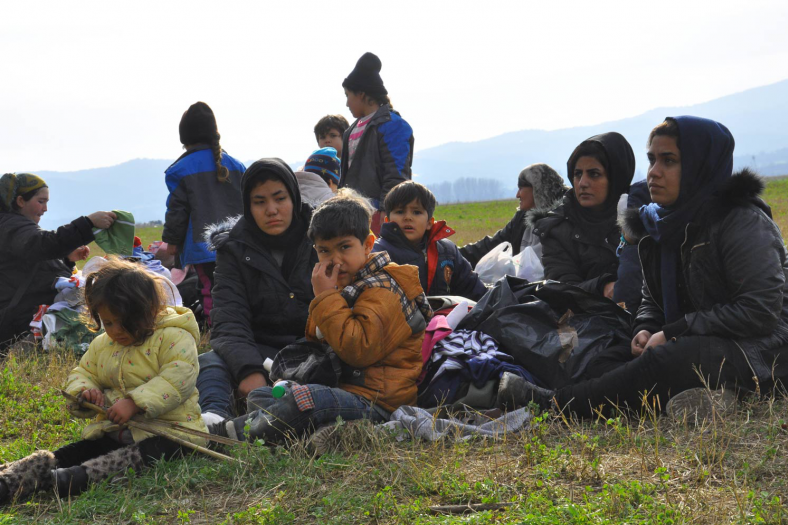
Train tracks for guide
These rails just outside the village of Idomeni in the north of Greece connect Thessaloniki with Skopje, the capital of Macedonia. The station of Idomeni is the last stop on Greek territory. A couple of sing posts and shunting-tracks mark the border with Macedonia, for the rest there is little that indicates that one county gives way to another here. Greece shares a border line of 228 kilmetres with Macedonia, but the largest part runs through the mountains.
The Macedonian police has an awful reputation when it comes to the treatment of refugees.
However, the train tracks are the main reason why Idomeni has become such a popular passage. The rails provide an ideal point of orientation, and guide refugees through Macedonia and Serbia to Hungaria. The route has it’s tradition. These tracks follow the course of the river Vardar, a major connection between the Western Balkan and the north of Greece during the Ottoman reign.
One of the Afghan at the smouldering fire tries to sum up his story in a few words. It is the second time he attempt to enter Western Europe. The last time he made it all up to Britain, but got arrested and was deported back to Kabul. This hasn’t stopped him from having a go for a second time with all the attendant risks.
Soon, the stories about the other side of the border come out. The Macedonian police has an awful reputation when it comes to the treatment of refugees. A man makes fierce gestures with his arms. He only speaks a few words English, but even so it is clear what he wants to express: a beating with the stick. Someone else shows the scratches on his face. In order to daunt migrants to cross, the Macedonian border police trashes regularly the spots where refugees spend the night. Sleeping bags and cloths get burned, phones and money stolen.
Criminal violence
To make matters even worse, apart from the police, some criminal groups have started to operate in the border region, lured by the money of the migrants. They are know to use violence without any restraint. A guy pulls out his mobile and shows a picture of one of their victims with a nasty knife wound on his head. Suddenly, the conversation falters. A jeep from the Macedonian border police arrives. One of the children cringes in fear. When the Macedonians notice that the migrants are not alone, they turn around quickly.
If you fall in the hands of the maffia, you loose everything. They know all too well that no one cares about our faith.
Bashar, also from Afghanistan, keeps up his courage, although he is wet to the bone. ‘Three times I tried to cross this damned border. Once I made it all up to Skopje, but they caught me and send me back.’ While we are talking we walk along the rail.
Suddenly Bashar notices that we are standing on Macedonian territory. ‘Don’t worry, the problems only start further ahead in the next village. Apart from the police, it’s loaded with these mafia types, armed with knives and guns. If you fall in their hands, you loose everything. They know all too well that no one cares about our faith. What can we do, after all? Call the police?’
Bashar has been living for more than seven years in Greece. He speaks the language fluently, and feels reluctant to leave. But with no legal document it has become impossible to find some black work because of the crisis. ‘If I manage to cross, I’ll go to Germany or Sweden. It has been more than five teen years since I left Afghanistan. Pakistan, Iran, Turkey, Greece,.. Five teen years, and here I stand, empty-handed.’ In the pouring rain, indeed.
Local solidarity
Idomeni, and the neighbouring village of Evzoni, are only a first step on a long journey northbound through Macedonia, Serbia and Hungary. This migratory movement throughout the Balkan started to bulge since 2012. Before, migrants made use of the sea route between Greece and Italy by hopping on a cargo ship in the port of Patras. While this still happens, the maritime option has become increasingly tough the last years. The same goes for making a living in Greece without papers, due to the economic downfall of the country.
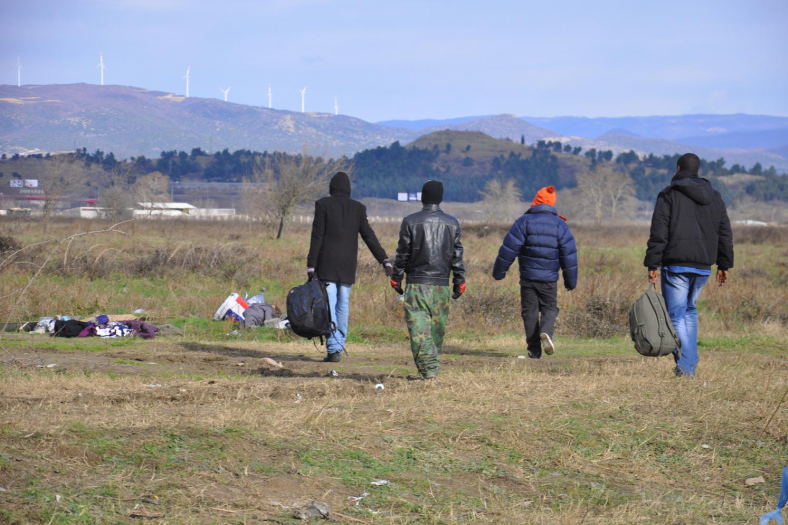
Idomeni is not the only border passage. Another option is to cross north of Florina, a Greek city more to the west. Until 2014, there used to be a secondary route through Albania, Kosovo and Serbia, but, for no apparent reason, it got out of use. Still, it was only in the summer of 2014 that the transit migration surfaced in Idomeni, according to Vasilis Tsartsanis, one of the local volunteers providing food, cloths and basic medical care to the refugees.
Supermarkets brought food, others provided cloths,… even people who voted Golden Dawn lend us a hand.
‘At first, the people crossing here in Idomeni were mostly Pakistani and Bengali, and to a lesser extend Africans,’ says Vasilis. ‘But we never saw them. You could find some traces at the border when a group has passed, but it only took place at night. Later the Afghans came, followed by the Syrians. After the summer, the situation blew up. Suddenly we were faced with hundreds of refugees at the border, not only men like before, but families with children as well. In the winter it became more calm, but once springtime, the flood of people started again.’
The inhabitants of Idomeni, Evzoni and the nearby town of Polykastro found themselves confronted with hundreds of refugees roaming in the fields out in the weather, waiting for an off-chance to cross the border. The locals react with an overwhelming solidarity, remembers Vasilis.
‘The people were in shock when the problem burst out. From all sides help came in. Supermarkets brought food, others provided cloths,… even people who voted Golden Dawn (Greek fascist party) lend us a hand. But a small community as ours cannot cope with an issue like this on the long term. We desperately need a solution.’

For years, Greece has been the worst pupil in the European class when it comes to migration.
For years, Greece has been the worst pupil in the European class when it comes to migration. The country has been raped over the knuckels on many occasions by human rights organisations and the EU alike. In spite of mounting criticism, the previous government left the issue further to rot. An absolute low was the operation called “Xenios Zeus”, an country-wide razzia by which the police made 85 000 arrests in order to check peoples documents. The new Syriza-led coalition has an entirely different view on migration, but it is still too early to see some changes in the field.
At the same time, Greece suffers from a devastation economical downfall with no end in sight, limiting the opportunities of undocumented migrants to make a living close to zero. If even a lot of young Greeks leave their homeland to seek a better life elsewhere, it isn’t hard to imagine how narrow economic possibilities for people without papers have become.
Greece’s geography isn’t helping neither. As Europe far-of South-Eastern corner, the country is the first stop for migrants both from the Middle East as from Africa, as well as from more far-off countries like Afghanistan, Pakistan and Bangladesh. Especially the desperate civil war in Syria and Iraq has set a new human river in motion.
The combination of a growing number of migrants leaving Greece after years of undocumented residency and the swelling transit migration heading for Western Europe explains why the Balkan Route has been on its way the last three years to become a major gateway into Europe.
Refugee hotel
An nondescript hotel at the border with Macedonia. Usually the place where weary drivers make a stop-over to pass the night before hitting the road again. Today, the dining room looks more like the recreation room of a refugee centre. Here, those who can afford it stay over night, trying to arrange their crossing. Most of them come from Syria, a few from Iraq.
‘I plan to go to Germany, but actually it doesn’t matter. A room where I could close the door, a sense of security, that’s enough.’
The brothers Ashraf and Kareem are new here. Their original plan was to cross on their own, but the stories about the brutality of the Macedonian police and extortion by dodgy criminal groups sowed the seeds of doubt. ‘We were approached by men who asked if we had money. Their second question was whether we were carrying weapons to protect us. Suspicious questions. I don’t feel at ease here,’ says Ashraf, the youngest of the two. ‘There are people walking around here with a lot of cash in his pocket and several phones. How did they lay their hands on it?’
Ashraf and Kareem come from Damascus. Both brothers worked in the once so vibrant night life of the city, Ashraf as a DJ Kareem as a bartender. The war swept their world away. ‘We fled for our compulsory military service. The regime simply puts a rifle in yours hands, without any training. I’m not a fighter,’ said Ashraf. ‘We had a good life in Syria, but everything has vanished. I plan to go to Germany, but actually it doesn’t matter. A room where I could close the door, a sense of security, that’s enough.’
The brothers left Damascus, then stayed for several months in Turkey before crossing the Aegean Sea to Greece, a trip that Ashraf will not forget easily. ‘The smuggler gave us the guarantee that we would travel from coast to coast, without having to swim, with a maximum of 20 people on board. It all turned out to be lies. We were crammed with 40 people in a rubber boat and sent off our own into the dark sea. Never before I was so scared.’
‘At sea, people got in a row over the direction of travel, fortunately a larger boat noticed us and assisted us to the shore. Each of us has paid 1 000 euro for a place on board, so you can do the math.’ Suddenly his story falters. A worries look comes over his face. Ashraf has spotted one of the men who approached him this morning. Being here for hardly a day, he sums up the situation in one sentence. ‘We Syrians are walking cash machines for every one here.’
Fresh money
The arrival of the Syrians has turned the dynamics at the border upside down. Until the summer of 2014, it was relatively easy to cross the border in the vicinity of Idomeni. Cheap, too. Most refugees simply walked along the train tracks into Macedonia, bought a bus ticket in Gevgelija, the first town on Macedonian territory or continued their journey on foot. A few hundred euros were enough to make the Macedonian police look the other way if you had the misfortune to be caught.
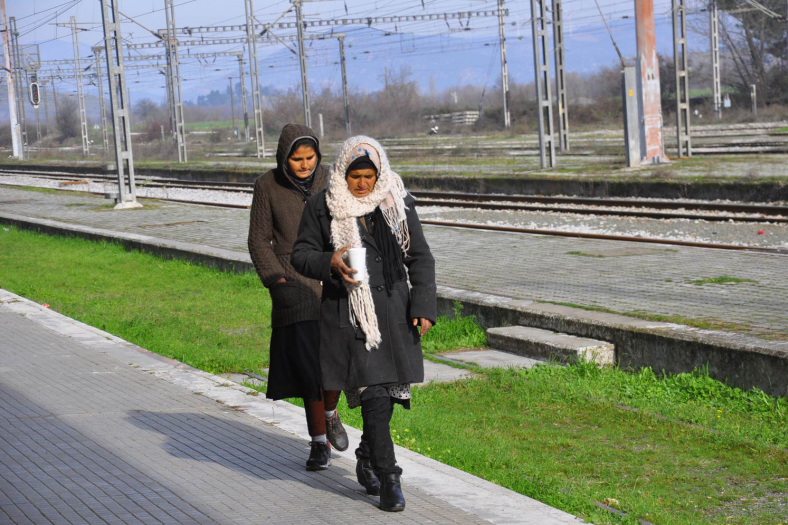
Refugees are fair game for traffickers, criminals and police officers with bad intentions.
But the rising number of transit migrants from Syria and Iraq changed a lot of things. For them, Greece is just a stopover, a hurdle to be taken as soon as possible. Germany is by far the most popular destination, followed by Sweden and Austria.
The whole trip from Turkey to Western Europe costs between 7 000 and 9 000 euro. The Syrians travel with a budget considerably higher than that of the people who, after years of clandestine living in Greece, seek a better life elsewhere.
The money of the transit migrants lured a lot of people with dubious intentions. In only half a year, a flourishing human smuggling business has emerged, with a lot of ugly sides. A DIY-crossing has become much more difficult. The coordination between the smugglers and the Macedonian police or criminal groups makes it almost certain that refugees without the right contacts will be arrested and /or robbed.
If smugglers on the Greek side get to know that a groups of refugees tries to pass the border without their services, they call their men on the other side to tell them that these people are not under their protection. Everyone knows only too well that, once across the border, the refugees are fair game. No one will stand up for their rights. They are the dreamed victims for traffickers, criminals and police officers with bad intentions.
Hostage in Macedonia
Madje wrings his hands nervously. The young Syrian from Daraa will take his change tonight. He has tried already a few times to pass er on his own, but with no luck. Time after time the Macedonian police caught and deported him. Now he has an appointment with one of the smugglers waiting for him outside the hotel, along with a few other Syrians. But the smuggler in question has a bad reputation. Madje do not know what to do.
Two days later, his fears turn out to be founded. A text message comes in if some one could, as soon as possible, contact the smuggler and demand him to hand over the money. The Pakistani gang that controls the border between Macedonia and Serbia monitors has locked him and his companions in the basement of a house somewhere in the border region. If the money does not come through they risk to get stuck there.
The whole evening his friends are calling back and forth, until finally, the redeeming message that the situation is resolved get through in the morning. It makes the stories of abduction, extortion and disappearances suddenly a lot more plausible.
The jungles of Europe
A short drive leads us from the train tracks to a grove somewhere in the fields. A few barracks, normally used by farmers to store their stuff now serve as a shelter for those who have luck to get their hands on a place inside. The rest sleeps under the sky. This is one of Europe’s newest “jungles”, as the refugees refer to these places.
Wherever transit migration gets struck in a bottleneck, this kind jungles pop up. In Calais and in Patras, in southern Italy, and now here in Idomeni. These are the waiting rooms where migrants stop over before the next step of the journey to what might be a better life.
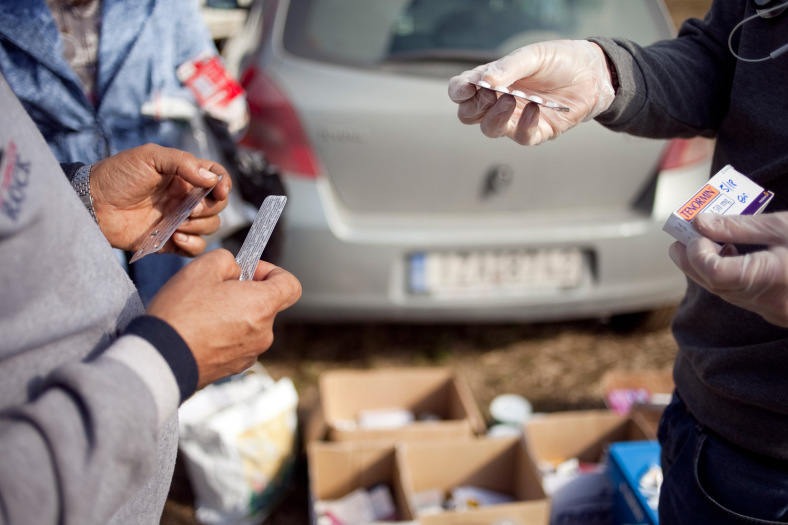
The more humane approach to migration that the new Syria government wants to institute, has clearly not sunk in everywhere.
A few refugees are already lining up for the medical team, the rest tickles in from the bushes. At least half of them needs medical care. A boy has some ugly blisters on his hand. A young woman sits down, sobbing incessantly. She’s clearly in pain, the doctor suspects an appendix inflammation, serious enough to take her to the hospital in Polykasto.
His suspicion proved correct, the woman must undergo a surgery the same day. Bus she refuses to stay at the hospital, she has no papers. Finally the doctor and Vasilis convince her to remain in the hospital, but a day later, the police stands on her bed. The more humane approach to migration that the new Syria government wants to institute, has clearly not sunk in everywhere.
Always a mouse hole
Back at the hotel. At a table, three guys sip from their tea. They come from Raqqa, once an unknown city in Syria, now the capital of the self-declared caliphate. The two brothers and their cousin fled the terror of the new rulers. The youngest brother tells how life used to be in Raqqa. He is the type of person for which there is no more place in Syria. A quiet voice, dreamy eyes…
‘See those guys over there dancing? Each of them are smugglers. They are having fun with our money. This place is rotten.’
He opens his phone and shows the paintings he made. Beautiful female portraits, but today, more than enough reason to be punished by the IS-fighters who call the shots in Raqqa. When he talks about all the efforts that he, his brother and his cousin already have taken to pass the border, he pauses. ‘Maybe I need such a thing, I don’t know the proper English word.’ He takes my pencil and notebook, and with a few pen strokes, a balloon appears.’
A few days later he has gone. His brother is still there, tormented by anxiety. Saleh, the youngest with the dreamy eyes, has left with a smuggler. They had to put their money together to pay for only one of them to cross.
Normally he would have arrived this morning in Lojane, Macedonia, but it’s already evening and still no news. While the elder brother is plagued by by his worries, five guys put on some loud music and start dancing, drawing a bitter remark from the elder brother. ‘See those guys over there dancing? Each of them are smugglers. They are having fun with our money. This place is rotten.’
Also in this dossier:
‘Europe, still one country ahead’
MO*reporter undercover in human trafficking in Macedonia
Bulgaria: Exquisite back door to the Balkan
‘I saw on TV how everyone was leaving Kosovo, so I went myself’
‘Do you know the way to Hungary?’
‘Welcome to Hungary (But not wholeheartedly)’
‘Human traffickers never keep their word’
Why some refugees do return to the hell of their homeland
The situation at the Greek-Macedonian border has deteriorated in recent months. More and more people get stuck there, waiting for their chance, while the price of the crossing continues to rise and criminal violence increases. Yet Vasilis Tsartsanis believes that closing the border would not be the right answer.
‘The smugglers will always find a hole. The route along Idomeni is the most visible, the most humane. Locking the door here would have as a result that that refugees will travel again through Albania. And there is no one who cares about their fate.
Blocking the migration flow does not stop it, there are just too many people desperately looking to make the trip, and there’s just too much money involved. The only solution is to allow refugees to apply for asylum in Europe legally. The current policy is driving them into the arms of criminals who earn lots of money on their misery. Europe must have the courage to face these facts.’

This report was produced with the support of Fonds Pascal Decroos.

Maak MO* mee mogelijk.
Word proMO* net als 2793 andere lezers en maak MO* mee mogelijk. Zo blijven al onze verhalen gratis online beschikbaar voor iédereen.
Meer verhalen
-
Report
-
Report
-
Report
-
Interview
-
Analysis
-
Report

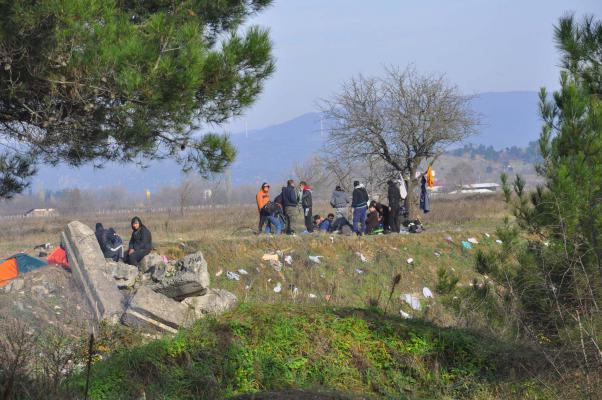


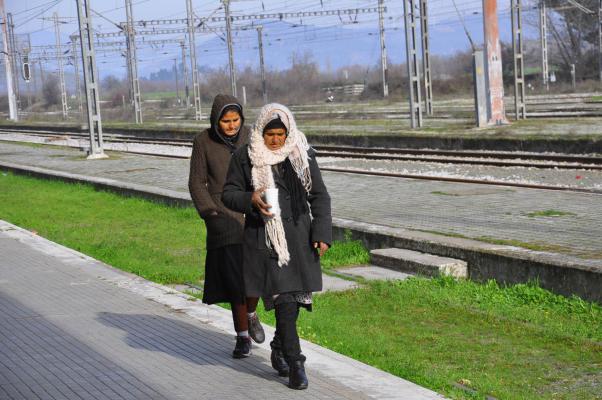


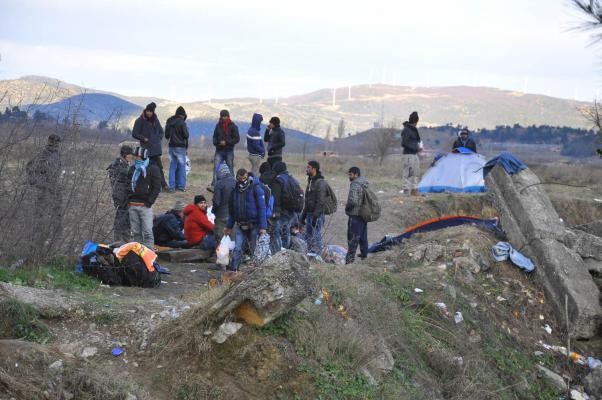


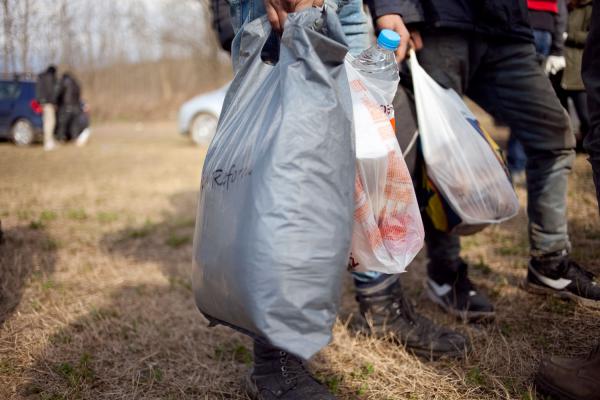

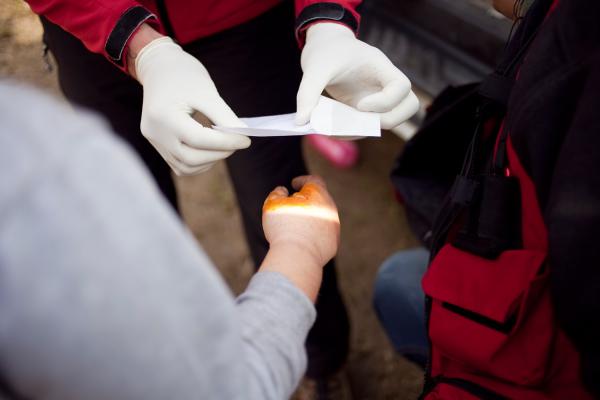


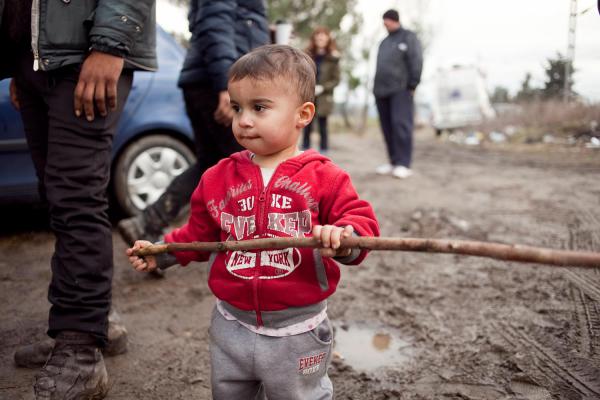


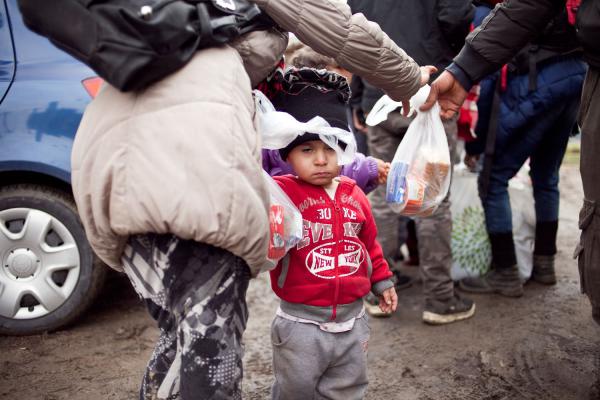


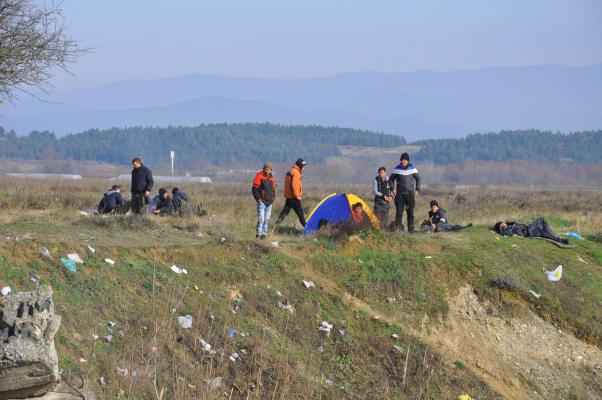

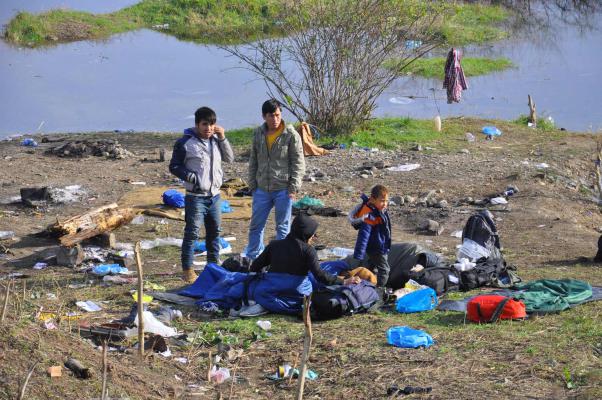

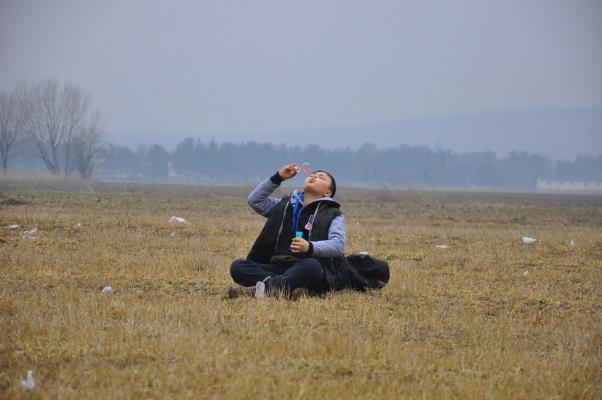


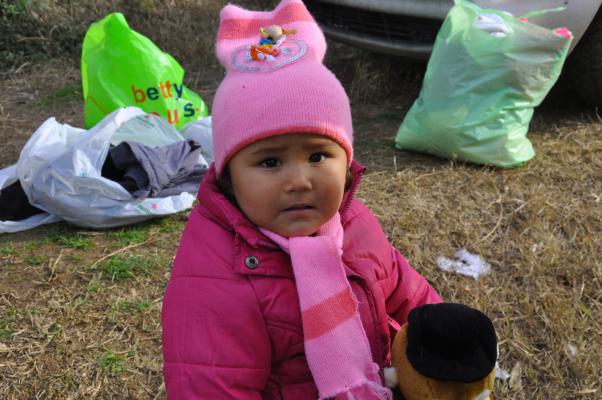
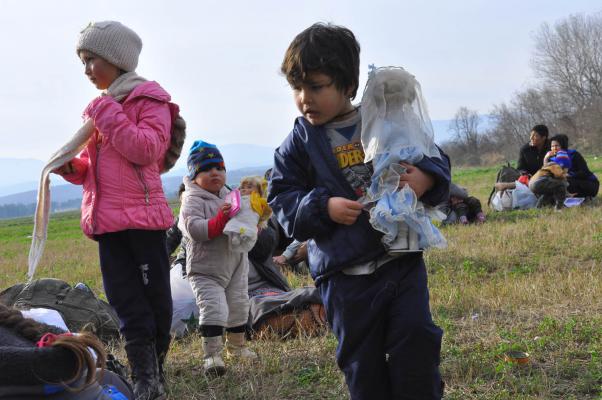









 Oxfam België
Oxfam België Handicap International
Handicap International